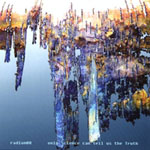
CD, Lotek Recordings, 2007
www.radium88.net
I am a scientist and believe strongly in its ability to reveal truth and, disregarding any philosophical arguments on questions of truth, I would place it well above any other belief system. Therefore, “Only Science Can Tell Us The Truth” has to be one of my favourite album titles in some time and potentially also one of the most truthful statements to appear on the cover of a compact disc sleeve. But can music tell us any truth? And how can science best be represented in musical form?
Radium88 is a Nottingham based electronica project apparently centred on pianist Tim Thwaites and aided by a number of skilled musician playing various actual instruments. It is this curious mixture of the electronic and acoustic, which is Radium88’s greatest asset in establishing a trademark sound, but at the same time seems at odds with their slightly sinister radioactive name and the boldly objective album title. To my mind the most scientific music would be purely electronic, with traditional instruments suggesting the arts and therefore opening room for doubt, but really these considerations are irrelevant semantics when judging the quality of a piece of music.
This is generally a high quality album from the start, with melancholic strings and piano melodies provoking genuine emotional responses the main attraction for me, while the downside is the uncomfortable inclusion of certain incongruous instruments, sounds or styles. Opener “Let There Be Lite” impresses greatly with tragic strings but then the arpeggio synth lines are a little irritating. “Sleepwalk” provides a pleasant surprise with the delicate soprano voice of Jema Davies, who later delivers a catchier pop number on “The Man Who Invented Himself”. But then the almost funky breakbeats and the way in which they are manipulated with odd flange effects, which occur a number of times throughout the album, are one of the major negative factors for my tastes.
The title track is one of the sadder piano centred pieces, and a similarly solemn mood can be found later on the violin led “Sometimes They Get Into The Machines”. One of my personal favourites is track seven, “Nostalgia For A Time That Never Was”, with a unique combination of warm organ, weary lead guitar and vaguely funereal synth melody, as is the sorrowful “Lullaby” with rich pads, fragile rhythms and a moving, subtle bassline. “Two Four Sorrow” is an upbeat piece of baroque synthpop topped effectively with the soprano vocals once more, before the wonderfully titled “Your Message Has Been Erased” returns to more sombre emotions, albeit with a glimmer of hope offered by grim Northern sounds of the cornet. This would have been a great end and as such the final three tracks appear weaker, featuring some of the displeasing elements mentioned earlier, especially the prog rock sounds of closer “Enter Hyperspace”, which is hard to take seriously and nearly spoils the positive results of an album which mostly has much to offer.
[7/10]
— Nathan Clemence
